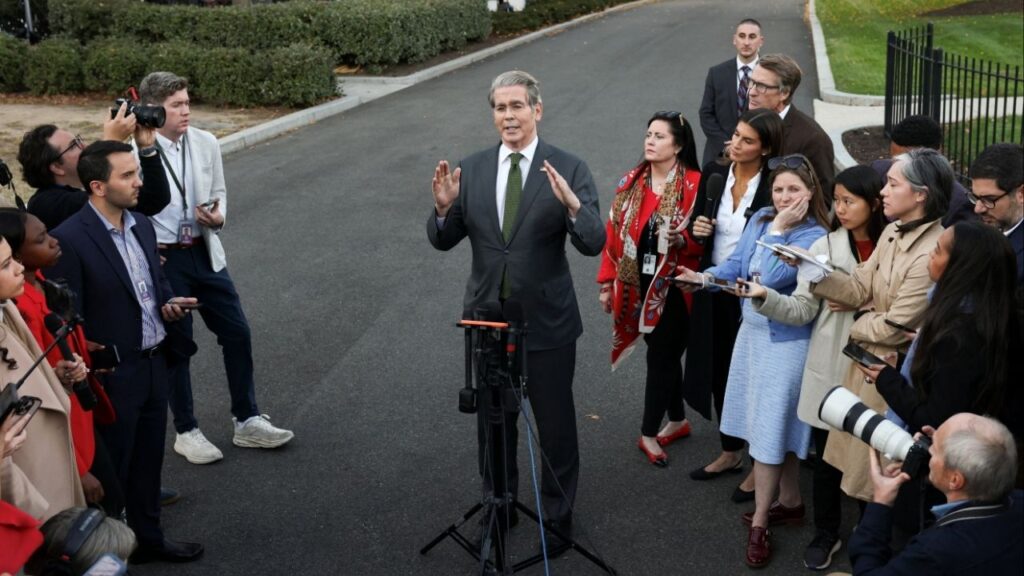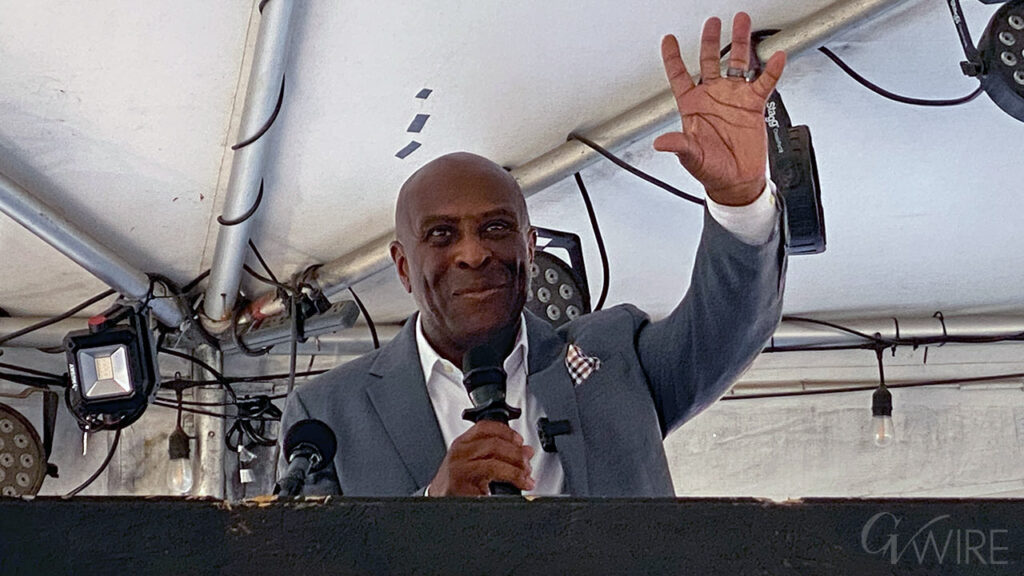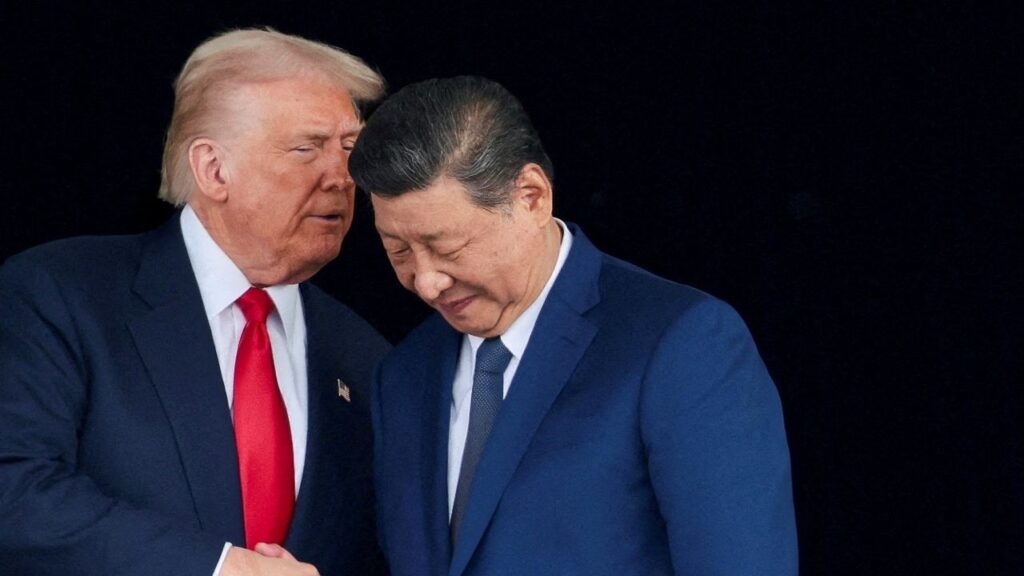Soybeans are harvested near Stuttgart, Ark., Oct. 25, 2023. The Trump administration has discussed providing financial aid for farmers who may be subject to retaliation by America’s trading partners. (Rory Doyle/The New York Times)

- Trump administration considers new farmer aid as potential retaliation looms over planned global tariffs, echoing the 2018 trade war response.
- Previous aid package cost $23 billion, but wider tariffs on allies may require even more taxpayer-funded relief this time.
- Economists warn tariffs could raise consumer costs, slash agricultural exports, and deepen financial strain on American farmers and businesses.
Share
|
Getting your Trinity Audio player ready...
|
WASHINGTON — Before President Donald Trump’s plan to impose sweeping tariffs across the globe this week, his administration is weighing a new round of emergency aid to farmers, who are likely to be caught in the middle if America’s trading partners retaliate.
The early discussions offer a tacit acknowledgment that Trump’s expansive tariffs could unleash financial devastation throughout the U.S. agricultural industry, a crucial voting base that the president similarly tried to safeguard during his 2018 trade war with China.
Trump Has Not Announced Details on Aid Package
While the president has not announced any details of an aid package, his advisers have signaled in recent days that he could follow a playbook similar to the one he used in his first term, when he directed billions in payments to farmers who saw their exports to China plummet amid a trade war with Beijing.
Such a rescue package ultimately proved expensive, with the government shelling out about $23 billion after China imposed high retaliatory duties on soybean, corn, wheat and other American imports beginning in 2018. That money came from a fund at the U.S. Department of Agriculture, a portion of which can be used to respond to emergencies, including trade disputes.
Agriculture Secretary Brooke Rollins said last week that the administration may look to offer emergency aid to farmers, telling reporters that Trump had asked her to “have some programs in place that would potentially mitigate any economic catastrophes that could happen” in a global trade standoff.
But the price tag this time could prove even higher, since Trump has threatened to target many countries, including U.S. allies such as Europe, Canada, Mexico and Japan. The potential scope of their collective retribution could inflict deeper, more lasting harm on American businesses.
“That could really lead to big demands in terms of trying to help farmers,” said Joseph Glauber, a research fellow at the International Food Policy Research Institute who previously served as the chief economist for USDA.
Trump Administration Discusses Possible Farmer Bailout
Administration officials have discussed the early contours of a possible farmer bailout with industry lobbying groups and Republican congressional offices, according to four people familiar with the matter, who spoke on condition of anonymity to describe the talks. They have raised a few potential mechanisms for providing the funds, some of which may require legislation, the people said, cautioning that the conversations were in early stages because Trump has not yet finalized his trade strategy.
But an expensive federal bailout threatens to cut deeply into one of Trump’s signature reasons for pursuing protectionist policies in the first place: a desire to rake in “lots of money,” as the president himself has said. Trump and his Republican allies say the new tariffs could help pay for their still-forming plan to expand and extend a set of expiring tax cuts, which could cost into the trillions of dollars.
“In addition to consumers being impacted by tariffs, now you have taxpayers who are going to be on the hook,” said Alex Durante, a senior economist at the Tax Foundation, a think tank that generally favors lower taxes.
The White House declined to comment, but an official — speaking only on condition of anonymity — said any discussions about tariff aid are preliminary given the ongoing discussions about Trump’s tariffs and his negotiations with other countries.
The USDA did not respond to a request for comment.
Economists Warn that Tariffs Fall on American Consumers
Economists broadly warn that the tariffs could fall heavily on American consumers, particularly if firms raise prices to compensate for the fact that they must pay more to import necessary goods. Those anxieties helped to send consumer confidence tumbling in March to its lowest level since January 2021, according to findings released last week from The Conference Board.
But the impact on farmers is expected to be particularly acute. China, which has been hit with 20% tariffs since Trump took office, has already retaliated with levies on chicken, wheat, corn and cotton. The European Union has drawn up a sizable list of agricultural and consumer products to target if Trump makes good on his threat to impose steep tariffs on that bloc.
Many domestic producers worry that Trump’s tariffs could undercut commodity prices and make their corn, eggs, soybeans and other goods less desirable to foreign purchasers if those nations respond with levies on American exports.
“Obviously, we’re concerned with the economics of where we’re at today,” said Kenneth Hartman Jr., an Illinois farmer who serves as president of the Corn Board of the National Corn Growers Association.
Once Trump’s tariffs take effect, Hartman said his industry would “love to see some new markets come about.” But he also expressed concern about a prolonged trade war, which could result in U.S. growers ceding markets to foreign competitors — or, worse yet, facing the risk of harsh retaliation from its longtime trade partners, particularly Mexico.
“That’s probably our biggest concern right now,” Hartman said.
Retaliation for Trump’s last tariff campaign, starting in 2018, resulted in a $27 billion loss in agricultural exports over that period, according to estimates by USDA economists. Much of the loss came as a result of a trade war with China, after Trump targeted a vast swath of the country’s exports, prompting Beijing to mete out its own punishment.
—
This article originally appeared in The New York Times.
By Tony Romm/Rory Doyle
c. 2025 The New York Times Company



















